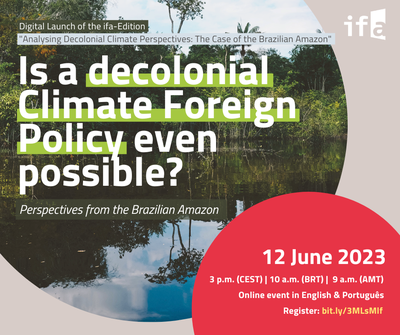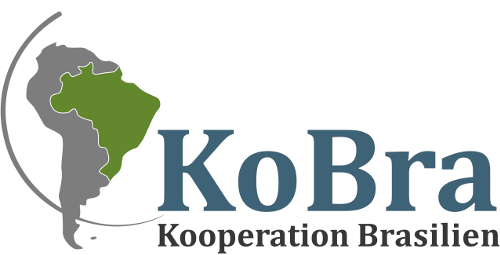Is a Decolonial Climate Foreign Policy even possible? Perspectives from the Brazilian Amazon

- https://www.kooperation-brasilien.org/de/veranstaltungen/termine/is-a-decolonial-climate-foreign-policy-even-possible-perspectives-from-the-brazilian-amazon
- Is a Decolonial Climate Foreign Policy even possible? Perspectives from the Brazilian Amazon
- 2023-06-12T15:00:00+02:00
- 2023-06-12T23:59:59+02:00
- Online Event des Institut für Auslandsbeziehungen (ifa)
- Wann 12.06.2023 von 15:00 (Europe/Berlin / UTC200)
- Wo Zoom
-
Termin zum Kalender hinzufügen
iCal
Please register for the online event here:
The latest UN Intergovernmental Panel on Climate Change (IPCC) report acknowledged that colonisation is one of the drivers of the climate crisis. As a result, the decolonisation perspective is central to the global response to climate change. Colonial legacies and unequal power relations between countries continue to shape international cooperation and influence how climate policy is conducted.
Although Germany's commitment is recognized by a wide variety of actors in Brazil, there is still a certain mistrust of the actual interests of these projects and initiatives.
How can Germany strengthen its partnership with Brazil regarding environmental and climate issues? How is this perceived by local stakeholders and activists? What would a decolonised approach in this international cooperation look like?
This event will discuss the central findings of the ifa Study "Analysing Climate Colonial Perspectives: the Case of the Brazilian Legal Amazon" with
- Marina Caetano and Pedro Affonso Ivo Franco, experts of ifa’s Reseach Programme „Culture and Foreign Policy“
- Ursula Vidal, journalist, Secretary of Culture of the State of Pará
- Thomas Fatheuer, Brasilien Initiative Berlin
Panellists
Pedro Affonso Ivo Franco is a Brazilian percussionist and consultant working across the cultural, creative and development sectors. Holding an MA in International Relations and Cultural Diplomacy from Furtwangen University, Germany, Pedro’s areas of expertise include culture and sustainable development as well as the role of creative clusters in local development and participatory governance in culture.
Marina Caetano is an experienced international cooperation professional involved in projects especially within the environmental and climate agenda. She investigated the role of the German International Cooperation for Development as part of the German Chancellor Fellowship, previously worked for the Konrad Adenauer Foundation and currently at Instituto Talanoa. Marina holds a Master in Sustainable Development and a Bachelor in International Relations.
Ursula Vidal is a journalist, filmmaker, political activist for environmental sustainability and Secretary of Culture of Pará. She is the Climate Reality Leader of The Climate Reality Project, promoted by the Al Gore Foundation. She was a fellow of the Lemann Foundation, the Political Action Network for Sustainability (RAPS) and Renova BR, the largest schools focused on training new political leaders in Brazil. Moved by the social and environmental problems of Belém, she ran for the mayor candidacy of Belém in 2016 despite a lack of resources.
Dr. Thomas Fatheuer is a social scientist, consultant, author, and staff member of the Centre for Research and Documentation Chile-Latin America (FDCL). He has lived and worked in Brazil for 18 years, and among other things, he was coordinator of the Amazon Programme of the German Development Service (ded) and advisor to the GIZ at the Brazilian Ministry of Environment in the framework of an international programme for the protection of tropical forests ("PPG-7"), and was the Head of the Heinrich Böll Foundation office in Rio de Janeiro (2003-2010).
